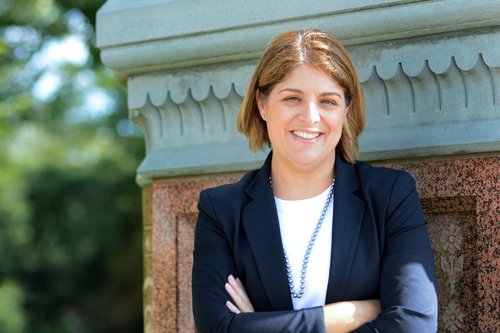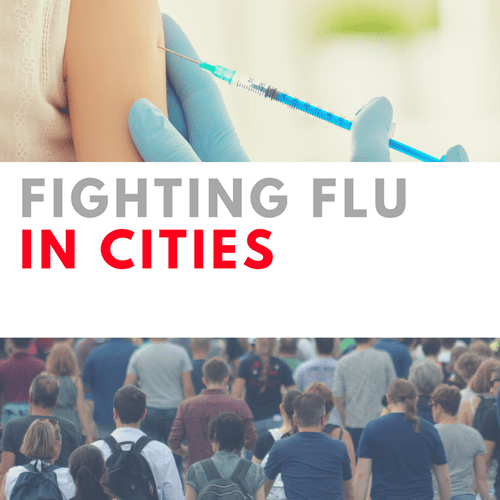Frontline Blog
Fighting Flu in Big Cities: Lots of Germs in that Big Petri Dish
November 2017
By Chrissie Juliano, Director of the Big Cities Health Coalition

Fighting seasonal influenza (the flu) is serious business. It may sound rather pedestrian compared to headline-grabbing diseases like Ebola or Zika, but fighting flu, and other such “routine” outbreaks, is what local public health departments do every day to protect lives.
In a moderate to severe year, seasonal flu kills more Americans than car accidents. Over the past 30 years, it’s killed anywhere between 3,000 and 49,000 people in single a flu season. It also costs Americans $87 billion in direct costs and lost productivity. In short, there are many reasons to fight flu.
The U.S. Centers for Disease Control and Prevention (CDC) estimates that 5 to 20 percent of the U.S. population gets the flu each year, tens of thousands are hospitalized, and thousands die from flu-related illness. Families, businesses, communities, and our pocketbooks all suffer if we don’t work to prevent the spread of flu.

This issue is especially important to the members of our Coalition, who are the leaders of the biggest, most urban health departments in the country. Flu spreads when people cough, sneeze, or talk, causing droplets to land on people nearby. People with flu can spread it to others who are up to 6 feet away. It can be spread more easily due frequent close contact. And people with the flu can infect others even before their symptoms start and while they are sick.
The ease with which this infection spreads may be particularly disturbing news to urban dwellers, many of whom commute to work or school via crowded public transportation. No doubt, if you ride public transit to work like I do, you have been seatmates with a fellow passenger who is coughing and sneezing while being cramped like sardines in a train car.
The best defense against flu, as with many diseases, is preventing it from striking in the first place through vaccination. While there are other important public health practices like “covering your cough,” and frequent, thorough hand washing, getting vaccinated is the first step in preventing someone from falling ill.
Another secondary solution is staying home when sick – for those of us who can. Many of our Coalition members are pushing to pass paid sick leave, otherwise known as earned leave laws, in their communities, because these policies help everyone in a workplace stay healthy. For example, in San Francisco, every 30 hours worked earns workers one hour of earned leave. Nationwide, many workers do not enjoy these protections, so they are forced to report to work – even when they are sick with a highly contagious infection. We need to change this. Earned leave works because the infected individual is less likely to spread the infection to others when they are able to stay home.
When a critical mass of people is immunized against a disease, whether for flu or measles or mumps, most community members are protected because there is less of an opportunity for the disease to spread. This is called “herd immunity.” It means that when you get your flu shot, you aren’t just protecting yourself, but those in your “herd,” your friends, family, and all the people you encounter in your daily routine. Herd immunity also protects those among us, who for a variety of reasons are not able to get immunized – newborn babies or those undergoing certain cancer treatments, for example.
Getting your flu shot – and vaccinating your family – is important, no matter where you live. There’s a reason your local health official, your pharmacist, and your kids (like mine) harp on you to get your flu shot. So do your part! Not just to protect yourself, but your community as well.